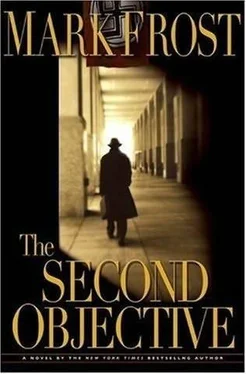“We’ll take him, but there’s going to be a wait. There’s a lot of wounded ahead of him.”
She stood up briskly and moved on. A young, moonfaced MP with a blond brush cut walked after her, and took a passing glance at Von Leinsdorf and Bernie. Von Leinsdorf met his eye, deep concern evident on his face, which the MP, Ole Carlson, took for worry over their wounded friend. Preuss moaned again, drifting in and out of the morphine clouds, head rocking from side to side.
“Schiesse…Schiesse…”
Bernie knelt down next to Preuss and laid a hand over his mouth. “Easy, easy, don’t talk.”
“He’ll come out okay, buddy,” said Carlson.
“Thanks,” said Bernie, lowering his head.
Carlson walked away following the nurse. Von Leinsdorf knelt beside Bernie.
“Take his tags,” said Von Leinsdorf.
“What?”
“Put these on him,” he said, slipping another set of dog tags from his pocket. “Take his ID and anything else that could tie him to us.”
Bernie reached into Preuss’s shirt and yanked off his tags as Von Leinsdorf stood watch. Bernie slipped the second set of tags into Preuss’s pocket, then pulled his forged ID card out of his jacket.
“Where’s his lighter?” asked Von Leinsdorf, as he tucked the card away.
“How should I know?”
“Find it.”
Bernie realized what he was asking. “I’m not doing that.”
“Then wait outside.”
“I know what you want it for; I’m not letting you do that-”
A young admitting nurse with a clipboard walked up to them. “I need some information before we take him to the ward.”
Von Leinsdorf reached past Bernie into Preuss’s pocket, fished out the tags they’d just put there and handed them over. “He’s not with our unit. We were driving by, he flagged us down and passed out in the jeep, so we brought him in.”
The nurse examined the tags and wrote down the name. “Sergeant Vincent Mallory.”
“See, we didn’t even know his name,” said Von Leinsdorf, continuing to rummage through Preuss’s pockets. “Maybe we can find something else to help you.” He fished out a silver Zippo lighter and a pack of cigarettes. “Don’t suppose he’ll be needing these for a while, huh?”
“You don’t know anything else about him?”
“You know as much as we do,” said Von Leinsdorf, pocketing the lighter.
The nurse printed the name on a strip of white tape and attached it to the stretcher. “You did a good thing just getting him this far.” She signaled a couple of orderlies, who lifted Preuss’s stretcher and carried him toward an adjoining tent.
“Where you taking him?” asked Bernie.
“To prep him for surgery. If you don’t know this guy, there’s no reason to wait, it’s going to be a while.”
The nurse moved off, following the stretcher.
“Shit. He’s going to come out of it and start crying for his Mutter ,” said Von Leinsdorf.
“Let’s get out of here.”
Von Leinsdorf looked around, thinking, before he answered.
“Wait here,” he said.
Von Leinsdorf followed Preuss into the next tent. As he entered, he picked up a clipboard hanging next to a bulletin board, pretending to study it as he tailed the stretcher. The orderlies set Preuss down in the busy prep center, where two dozen wounded lay waiting, separated by screens, attended by an assembly line of nurses and orderlies.
Standing near a busy nurses’ station by the entrance to the operating theater, Von Leinsdorf watched them strip off Preuss’s jacket and shirt and plug him into an IV. Moments later, Von Leinsdorf buried his face in the clipboard when Dorothy Skogan walked up to the desk with Ole Carlson and a supervising orderly.
“I don’t have time for this shit now,” said the orderly.
“He just wants the bullets we pulled from the maxillofacial we did this morning,” said Dorothy.
“We got a hundred people shot to shit, what’s the rush?” asked the orderly.
“Criminal investigation,” said Carlson, showing his badge. “There’s a harder way to do this, you want to give that a try?”
The orderly sighed. “Patient’s name?”
“Mallory, Vincent Mallory. He was brought in late last night.”
Von Leinsdorf was about to move toward Preuss when he heard that name, and stopped to listen.
“Where is he now?”
“He’s in recovery. I’ve got to get back to work,” said Dorothy.
“That’s fine, I can take it from here,” said Carlson. “Thanks for your help, Dorothy.”
Skogan left for the operating theater. The orderly sifted through a pile of paperwork on the desk, looking for Mallory’s.
“Your chances ain’t good. We usually toss everything when we scrub down,” said the orderly.
“Anything you give us is really appreciated,” said Carlson, smiling patiently.
Neither of them noticed Von Leinsdorf walk out of the prep tent. He stopped a passing nurse to ask: “I’m looking for a man from my unit just came out of surgery, where would he be?”
She directed him outside to an adjoining tent. Von Leinsdorf carried the clipboard with him, sloshed through the mud, and parted the flaps of the recovery tent. Quieter in here, fewer lights, sharp contrast to the chaos in the OR. Patients rested on cots in cubicles created by curtains. Two nurses moved from one man to the next, making notations, monitoring medication. Von Leinsdorf slipped on a white coat, kept his focus on the clipboard, and drew no attention as he walked by. He glanced in each cubicle he passed, reading the names on strips of white tape attached to the foot of their cots.
He found Mallory’s name but didn’t recognize the man on the cot as the sergeant he had shot at the checkpoint. His face was bloated by surgery and covered with bandages. Another man stood to the right of the cot, arms folded, looking down at Mallory. Broad shoulders, rangy, weathered-a “tough customer” was the slang that came to Von Leinsdorf’s mind. The man wore a regulation uniform with no insignia. That may have been the privilege of an officer, but this one had the leathery aura of a seasoned noncom. Von Leinsdorf walked past the cot, stepping in to look at a patient two beds down.
Von Leinsdorf pieced together a scenario: Someone found Mallory where they’d left him in the woods. Alive, against all odds. He might have talked about the shooting but his condition suggested otherwise. Von Leinsdorf had learned as much as anyone alive would ever want to know about the nuances of dying. He knew exactly how to gauge death’s approach, when it was ready to make its final embrace.
This man was hanging by a thread. A whisper would nudge him into its arms.
The man standing over Mallory rubbed his face and headed for the exit. They nearly collided; Von Leinsdorf let him pass. As soon as the man left, Von Leinsdorf stepped back to Mallory’s cot and took Preuss’s Zippo lighter from his pocket. Opening a pocketknife he pried away the wick and flint and removed a small glass vial from the cavity. He used the knife to cut a slit in the IV bag attached to Mallory’s arm. Snapping the head off the vial, he poured the clear contents through the slit into the bag. A nurse walked into the ward. He pocketed the empty vial and walked away without looking back. Stepping out of the tent, he dropped the vial and crushed it into the mud.
A minute later Grannit walked back into the tent with a cup of coffee, saw the man’s legs bucking and kicking, his arms twitching, head whipping from side to side, his breathing rapid and labored. He called out for the nurses and used all his weight to restrain Mallory on the cot. The man’s eyes opened, the pupils fixed and unseeing. Bright cherry-red blood streamed from his nose and mouth. By the time a trauma team arrived, Mallory’s limbs had gone rigid and he had stopped breathing. Grannit stepped back and let them work.
Читать дальше












